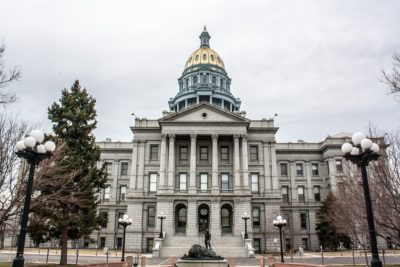In the wake of the recent protests on the streets of Denver in solidarity with protests in Minneapolis over the murder of George Floyd – protests that saw Denver police attack peaceful protestors, news media, and even first responders – the Colorado Senate has introduced SB20-217; legislation to improve public confidence in the integrity of law enforcement.
The announcement on Thursday, by Senate President Leroy Garcia, Senator Rhonda Fields, Representative Leslie Herod, and Representative Serena Gonzales-Gutierrez formalizes repercussive actions regarding police brutality and requires increased transparency by requiring the use of body-worn cameras.
“Communities of color have been brutalized by police discrimination and violence for far too long and the recent demonstrations reflect that,” said President Leroy Garcia (D-Pueblo). “Police officers are in a position of public trust and should be held to the highest standard of conduct and accountability. But countless officers have escaped justice–eroding people’s confidence in those responsible for protecting the community. We need to root out those causing this erosion and reform our police transparency and repercussion standards.”
“Coloradans who have taken to our streets to protest injustice and declare that Black Lives Matter were sparked by an incident in Minnesota, but we’ve seen similar tragedies happen in our own state,” said Black Caucus Chair Leslie Herod (D-Denver). “We need to make changes here at the State Capitol and at statehouses across the country. We will take action to protect black lives, hold law enforcement accountable, and ensure those police officers truly serve and protect all of us.”
Additional transparency measures outlined in the bill include mandating that all law enforcement agencies must track and publicly report data, including demographic information on uses of force, stops of civilians, searches of civilians, and forced entries into homes. The intent is that this information will then become a Department of Public Safety annual report.
The bill would also bring Colorado law in line with Supreme Court precedent, reining in the use of deadly force by officers. The Supreme Court framework specifies that deadly force may only be used when there is an imminent risk to human life.
If any peace officer is convicted of, pleads guilty to, or fails to intervene in the inappropriate use of physical force, they will be immediately terminated, decertified, and barred from any future posting.
Supporters say that SB20-217 would help prevent the rehiring of officers who are found untruthful, terminated for cause, or are decertified, by listing them in a database that would prevent them from moving from one law enforcement agency to another, where they could continue to do harm.
Finally, this legislation would remove the ability of officers to avoid public accountability by removing their eligibility for qualified immunity which has shielded officers from consequences and denied families justice.
In introducing the bill, Garcia and Herod pointed out some alarming statistics:
- In the U.S., African Americans are at least 2.5 times more likely to be killed by police than white people.
- They are also 1.3 times less likely to be armed compared to Caucasians.
- Despite well-documented cases of the use of excessive force, 99 percent of killings by police have not resulted in officers being charged with a crime.
According to recent studies, there are solutions that are proven to significantly reduce the number of police killings, but few departments have adopted them.








It’s about time. Anyone who lives in Chaffee county knows about the excessive use of force by law enforcement there. I personally have experienced it from Spencer Blades. I hope these laws pass and they can prevent the future abuses of cops with tempers like Blades.
I was hoping to learn about SB20-217, but instead found this a horribly biased “article” regarding the bill. I thought journalists were supposed to report the facts. That bill appears to be designed to punish police and nothing more. You cite no sources for statements or the claims at the bottom of the article other than the key proponents of this bill. You should be ashamed of yourself. Apparently you are, as you would not even ascribe your name as the author. Instead, you went with “Ark Valley Voice Staff. What a joke of an organization.
This piece is from a press release put out by the Colorado Legislature — as such it is not the writing of an individual AVV writer, nor is it our opinion. The sources of the links were provided by the Colorado Legislature. If you have a problem with that, Ark Valley Voice suggests that you reach out directly to the bill’s framers. Or write a letter to the editor discussing what you believe the inaccuracies of the bill to be.
Since the bill was just put forth yesterday afternoon, we have not had the opportunity, nor the staff time, to do a critical analysis of the proposed bill. We would do that in conjunction with the Colorado Media Collaborative and the Colorado Press Association, of which we are members. I assure you, we are not a “joke”, but since you criticize without providing your name, does that mean you do not personally stand behind your words?